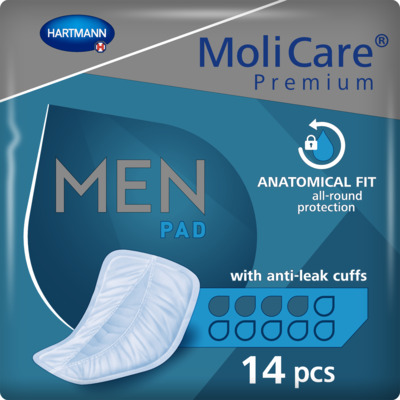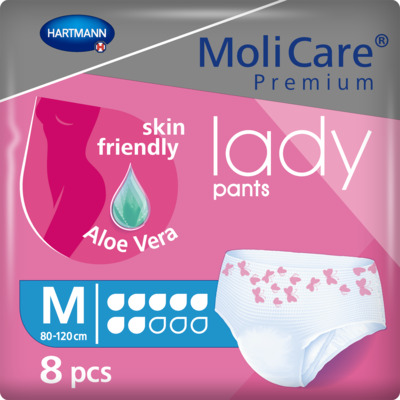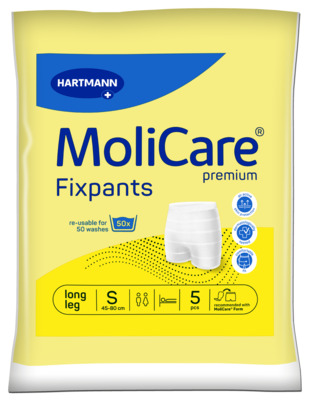Active living
How To Live With Incontinence
Millions of people are living with incontinence in the UK. In its various forms and challenging symptoms, it is not an easy experience to adjust to. However, in this article, you will find all the information you need to understand how to ease living with incontinence, including what incontinence means, the numbers affected by the condition in the UK, attitudes and awareness about incontinence, risk factors for developing it, as well as using incontinence pads and pull up pants that can help make things easier.
Before we begin, we have multiple articles that focus specifically on incontinence, and the various topics associated with it. For more information, check out our advice centre which is exclusive to Hartmann Direct UK.

What Does Incontinence Mean?
Incontinence derives from the Latin word 'incontinens' which means 'not containing;' this describes the inability to control your bladder. This condition can affect people of different age groups. While it's more commonly associated with elderly people, particularly those aged over 65, it's important to be aware of the causes of bladder weakness and incontinence, since it isn't exclusive to a specific age or gender group.
In fact, urinary incontinence, which includes conditions like stress incontinence - (where urine leaks during physical exertion) - affects women three times more than men. Pregnancy is also a common cause, so be sure to consider the correlation between pregnancy and incontinence to maintain bladder health and control.
It is also important to be aware of faecal incontinence, which, although less common, can occur in all age groups.
Products for women
Take a look at our incontinence products for women
Living With Incontinence
- Sources
- What Does Incontinence Mean?
- Treatment Options for Incontinence After Prostate Surgery
- Incontinence in the UK
- Who may be affected in the UK?
- Risk factors for incontinence
- Why you are not alone with incontinence
- Why use incontinence products
- How to live with incontinence
- How to manage incontinence
- Living with incontinence in the UK
- FAQs
Incontinence in the UK
While incontinence affects millions worldwide, our focus here is on its impact within the UK. Despite the significant increase in incontinence in the UK, many remain uncertain and unaware of the condition or the treatments that are available. Some consider there to be a stigma surrounding incontinence, which can lead to dealing with incontinence anxiety.
Who May Be Affected in the UK?
Statistics have shown who is most likely to be affected by incontinence in the UK, and highlights how long people delay a diagnosis. On average, one in five people are aware that they have incontinence. These statistics underscore the urgent need to break the silence surrounding incontinence, because an earlier diagnosis will help in preventing or easing the condition sooner.
Not consulting a healthcare professional about the condition can gradually allow the effects to worsen, and while it may seem daunting, getting a prompt diagnosis is better than leaving your concerns unnoticed. Even speaking to family and friends can help to make you feel more confident and supported when discussing it openly, therefore, breaking the embarrassment around incontinence.
Risk Factors for Incontinence
Incontinence can be influenced by various factors, including:
Age: As mentioned earlier, elderly people are more susceptible to incontinence due to age-related changes in the urinary tract.
Obesity: Excess weight can put additional pressure on the bladder and pelvic muscles.
Pregnancy: Women who have given birth, especially multiple times, may face a higher risk, as well as how the baby arrives during birth.
Hysterectomy: Surgical procedures like a hysterectomy can impact bladder control.
Race: Studies show different types of incontinence are more common in different racial groups.
Mobility: Limited mobility can affect the ability to access toilet facilities quickly, which can also affect how often you should wee. Understanding functional incontinence is the first step towards effectively managing the condition.
Diabetes: This chronic condition can contribute to nerve damage affecting bladder control.
Dementia: Cognitive impairments can lead to communication difficulties relating to incontinence.
Menopause and Hormonal Replacement Therapy (HMRT): Hormone changes during the menopause and hormonal treatments can influence bladder health.
Infections: Lower urinary tract symptoms and infections can exacerbate incontinence.
Smoking: Studies have shown that smoking will increase the effects of incontinence.
Undertaking a risk assessment with your health care professional can help you to determine the factors that may influence your incontinence type.
Why You Are Not Alone With Incontinence
In the UK, bladder problems (in men) and urinary incontinence is more widespread than what you might think. Statistics reveal that approximately one in five people, spanning all age groups, are living with bladder issues. To put this into perspective, that's nearly the equivalent of the entire population of those over the age of 60 in the UK. The scale of incontinence is further emphasised by estimates from the NHS, which suggests that between three and six million people in the UK experience a form of urinary incontinence. To help determine whether you have urinary incontinence, follow our advice about the causes of urinary incontinence.
When it comes to faecal incontinence, studies indicate that it affects approximately 1.4% of the general population over 40 years old in the UK. Another common concern is constipation, which impacts between 3% and 15% of the population. These figures underscore the fact that incontinence is not an isolated issue; it affects a substantial portion of the UK population, across various age groups and backgrounds. Knowing that you are not alone in facing this challenge can be a reassuring starting point for learning how to live with incontinence.
Why Use Incontinence Products
For those living with incontinence, we highly recommend using our range of incontinence products, which can help the experience of managing incontinence and will allow you to continue with your daily activities without worries of leaks. Incontinence products come in a range of styles, pads, pants and adult nappies, all of which can help with the following instances:
- Optimal Overflow Protection
Incontinence products such as our molicare premium elastic can be tailored to everyone’s size. MoliCare products are designed with an anatomical shape and a liquid-repellent inner cuff which will aid in establishing comfort and security, allowing you to go about your daily life confidently. Skin Health: Keeping your skin in good condition while wearing incontinence products is essential for an easier and more comfortable experience. You could use skin care products alongside your incontinence pads.
Discreet: Maintaining privacy and dignity is at the forefront of our mission to help you live well with incontinence. The discreet design, along with the neutralising urine odour functions, will make everyday life a lot easier. You can learn more by checking out our guide on how to control incontinence smells.
How to Live with Incontinence
Living with incontinence doesn't have to be complicated. Here are some straightforward ways to help you manage the condition effectively:
Plan Ahead: Before heading out, take a moment to plan your day with incontinence in mind. If certain activities or exercises trigger leaks, consider alternatives that are more bladder-friendly. For instance, if using the stair-climbing machine at the gym causes issues, try a stationary bicycle instead.
Additionally, consider carrying incontinence products with you, especially if you anticipate spending extended periods away from home. You could also research the location of toilets along your route to help you locate them quickly and easily when you are out.
Drink Wisely: We recommend drinking five to six cups of water a day to prevent dehydration, whilst limiting the consumption of tea, coffee, and other caffeine related fluids, as these diuretics which remove excess fluid will make you wee more of the fluid anyway. Consult your GP for further guidance on the right amount of fluids to consume per day, as well as the integration of bladder friendly drinks.
Identify Trigger Points: Certain foods and drinks can exacerbate your symptoms. Alcohol and caffeine-containing items are common culprits. Spicy foods, high-acid foods like citrus fruits, and carbonated drinks can also increase the urgency to urinate. If you notice that your incontinence worsens after consuming these, consider reducing or eliminating them from your diet.
How to Manage Incontinence
You can learn how to live with and manage incontinence daily with some of these essential tips:
Pelvic Floor Exercises: Regular pelvic floor exercises can improve pelvic floor muscle tone, which can reduce leaks.
Quit Smoking: Smoking can increase the risk of incontinence as the chemicals in tobacco irritate the lining of the bladder, and a chronic cough can put strain on the pelvic floor muscles.
Choose the Right Exercises: High-impact activities like jogging and sit-ups can stress pelvic floor muscles and exacerbate leaks. Consider low-impact options such as Pilates, which strengthens core muscles and benefits stress incontinence, as well as these other sporting activities with incontinence.- Be Cautious with Lifting: Lifting heavy objects can strain pelvic floor muscles.
- Maintain a Healthy Weight: Excess weight can weaken pelvic floor muscles due to pressure from fatty tissue on the bladder.
- Constipation Techniques: Straining during bowel movements can weaken pelvic floor muscles and worsens urinary incontinence. Consult a specialist regarding bowel movement techniques.
- Limit Caffeine and Alcohol: Both caffeine and alcohol can aggravate the bladder, leading to incontinence symptoms. Reducing or eliminating consumption may provide relief.
- Stay Hydrated: Drink five to six glasses of water a day, unless otherwise advised by your healthcare professional. Limiting fluid intake can exacerbate incontinence and potentially lead to an irritated bladder from concentrated urine, an infection, or constipation.
Living with Incontinence in the UK
In conclusion, living with incontinence in the UK is common and should not be stigmatised. Sharing your experiences can lift the taboo surrounding incontinence and prove that you are not alone with it. Simple strategies like planning, monitoring your fluid intake, and identifying triggers can make a significant difference, and consulting your healthcare professional for further diagnosis and treatment. Seeking support from loved ones or online resources can provide valuable insights too.
FAQs
What should you not do if you have incontinence?
Don’t ignore the issue. Consult your healthcare professional for diagnosis and guidance. Don't restrict fluids, as dehydration can worsen incontinence. Don't isolate yourself socially; stay active and engaged. Don't neglect treatment options or emotional well-being. Seek support if needed.
Can you live a normal life with incontinence?
Yes, with proper management, it's possible to live a normal life. Seek medical advice and make lifestyle adjustments. Explore incontinence products. Prioritise emotional well-being. Continue social activities and relationships.
How do you care for someone who is incontinent?
Maintain open communication. Assist with hygiene and changing incontinence products promptly. Ensure a proper supply of products. Support a balanced diet. Offer emotional support and seek professional help if needed.
How to stop incontinence?
To manage incontinence, it's important to consult a healthcare professional for personalised advice. Common approaches include pelvic floor exercises, bladder training, dietary modifications, and, in some cases, medications or surgical interventions. Regular medical consultation is key for effective treatment.
Sources
- Hartmann.Info (n.d.) Time to Break the Silence. [online] Available at: https://www.hartmann.info/en-corp/articles/d/8/incontinence-time-to-break-the-silence [accessed 30/10/23]
- All About Incontinence. (n.d.) Incontinence Statistics. [online] Available at: https://www.allaboutincontinence.co.uk/incontinence-statistics [accessed 30/10/23]
- NHS Inform. (n.d.) Urinary Incontinence. [online] Available at: https://www.nhsinform.scot/illnesses-and-conditions/kidneys-bladder-and-prostate/urinary-incontinence/ [accessed 08/11/23]
- Online Etymology Dictionary. (n.d.) Incontinence. [online] Available at: https://www.etymonline.com/word/incontinence [accessed 08/11/23]
- Perry, S., Shaw, C., McGrother, C., Matthews, R. J., Assassa, R. P., Dallosso, H., Williams, K., Brittain, K. R., Azam, U., Clarke, M., Jagger, C., Mayne, C., Castleden, C. M., & Leicestershire MRC Incontinence Study Team (2002). Prevalence of faecal incontinence in adults aged 40 years or more living in the community. Gut, 50(4), 480–484. https://doi.org/10.1136/gut.50.4.480 [accessed 08/11/23]

MoliCare® Premium Men Pad 4 Drops
<h2>Comfortable and absorbent</h2> <p>Why MoliCare for men? Hers are some of the key features of the MoliCare® Premium Men Pads from Hartmann:</p> <ul> <li>Discreet and comfortable</li> <li>Fits the male physique</li> <li>3-layer absorbent core</li> <li>Fast-absorbing system</li> <li>Anti-leakage cuffs</li> <li>Odour neutralisers</li> <li>Wide adhesive strip</li> <li>Skin-friendly</li> </ul> <p>With an affordable price and great quality guarantee, you cannot regret choosing MoliCare® Premium Men Pad 4 drops, equipped with anti-leak cuffs, and 14 pieces per bag.</p> <h2>Slim and discreet under clothing</h2> <p>MoliCare® Premium MEN Pads offer reliable support for men dealing with bladder weakness. Whether it's stress incontinence or urge incontinence, these pads for men are designed to provide a discreet and quick solution on the go. Simply place the pad before applying your underwear and secure it with the adhesive strip for worry-free protection. MoliCare® Premium MEN Pads offer full coverage for men facing very light to moderate bladder weakness.</p> <h2>Leakage protection for men</h2> <p>MoliCare® understands that each individual's incontinence needs are unique. That's why our incontinence products, including MoliCare® Premium MEN Pads, are available in different absorbency levels. You can find the perfect fit and protection for your specific requirements.</p> <h2>Reliable and soft on the skin</h2> <p>Our body-shaped absorbent pads are designed to deliver dependable and skin-friendly incontinence protection every day. Experience discreet comfort with the soft, cotton-like materials and the added benefit of an odour neutraliser, ensuring you feel fresh and confident throughout the day.</p> <h2>Fast delivery to your home</h2> <p>At HARTMANN Direct, we ensure a fast delivery service for all our products. Enjoy free delivery on orders over £50, making it convenient and hassle-free to receive the incontinence products you need. Our dedicated customer care team is here to discuss your incontinence product needs and answer any questions you may have. Call us today on 0800 028 9470 to experience the comfort and confidence that MoliCare® Premium MEN Pads can provide.</p>
MoliCare® Premium Lady Pants 7 Drops
<h2>Comfort and Confidence</h2> <p>Experience the comfort and confidence of MoliCare® Premium Lady Pants, specially crafted for moderate incontinence. These slimline and discreet incontinence pants feel just like regular underwear, but they offer superior dryness and protection you can trust from MoliCare®.</p> <p>If 7 drops is too much or too little, we still have plenty of other MoliCare® Premium Lady pants, available in different drop capacities, to suit your every incontinence need. Whichever you go for, our Premium Lady Pants provide the ideal support for your moderate incontinence needs, empowering you to carry on with your daily activities worry-free.</p> <h2>Discreet fitting incontinence pants</h2> <p>The Premium Lady Pants are thoughtfully designed with a lower waistline, ensuring a discreet fit under your clothes. The soft, pH-balanced, and breathable material embraces your body, providing maximum comfort. The quick-drying central layered core rapidly absorbs and locks away moisture, keeping you dry and comfortable throughout the day. Additionally, the Aloe Vera treated top sheet safeguards delicate skin.</p> <p>Worried about leaks? Don't be. Our Premium Lady Pants feature elasticated cuffs that protect against leakage, and special neutralisers seal in odours, leaving you feeling confident, dry, and fresh.</p> <p>These incontinence pants cater to active women as well as those with reduced mobility, providing reliable protection against moderate bladder weakness.</p> <h2>Choosing your Size</h2> <p>Measure waist at the largest width between the waist and hips. Select the product size based on the below sizing.</p> <ul> <li>Medium: 31-47 inches (80-120cm)</li> <li>Large: 47-59 inches (100-150cm)</li> </ul> <h2>Fast delivery</h2> <p>Managing incontinence doesn't have to be a hassle. Our delivery service ensures you receive the products you need right at your doorstep. With easy online reordering and fast shipping, we even offer free delivery on orders over £50.</p> <p>If you have any questions or need assistance, our friendly customer service team is here to help. Just give us a call at 0800 028 9470 to discuss your requirements. Discover the comfort, confidence, and convenience of MoliCare® Premium Lady Pants today.</p>
